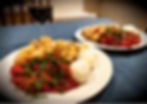#ThatTranslatorCanCook week 9: Basque Piperade
- Hannah Lawrence
- Oct 16, 2019
- 3 min read
While last week’s crumble recipe had me exploring the wonderful world of squashes, this week had me researching varieties of peppers, for this Basque Piperade (Pipérade) recipe.
Cooked slowly over a low heat, this dish uses a few different types of peppers, along with onions, garlic, and tomatoes. Packed full of summer flavours, it works well as a light main with bread or potatoes, or as a side dish.
Translation
The problem with translating household ingredients
Again, I struggled with producing the right produce. My recipe called for poivron, piment doux and piment d’Espelette. The first two caused me a bit of a headache.

Poivron is the regular type of ‘pepper’ from the supermarket’s produce section (‘bell pepper’ in the US, and ‘capsicum’ in NZ and Australia – much clearer I think!) – apparently sometimes referred to as ‘sweet pepper’.
To confuse matters, a word-for-word translation of piment doux is also ‘sweet pepper.’
What’s more, on the Gardening section of Le Monde, I found a statement which seems to suggest they are one and the same: 'Le poivron est vraiment le cousin du piment mais ses fruits ont une saveur bien plus douce, d'ailleurs, on l'appelle aussi "piment doux"'. Meanwhile, elsewhere, poivron is described as a type of piment doux.
I consulted a number of websites. I asked around. I google image searched...
And I have to say I’m still pretty much none the wiser as to the difference between poivron and piment doux.
Are they simply different shapes? Is this a distinction made in France but not in the UK? Perhaps we don’t get this variety of pepper here?
Can anyone enlighten me?
As for piment d’Espelette, Espelette Pepper, this is a specific type of powdered chilli pepper from the Basque region. When I came to cook it, I substituted it for what is described as the next best thing: hot paprika. I did visit an impressive spice stall at Borough Market recently and enquired after it – they were sold out, but I was told it does have a very distinctive flavour, with a vaguely fishy taste.
This French website also has more details about different types of peppers (unfortunately no help with piment doux though).
Bucking the trend: greater concision in French
It’s generally accepted that English is a more concise language than French – that is, the same message can often be portrayed in fewer words. However, this is not always the case. During this challenge, I’ve learned (or been reminded of) some great French verbs which often need to be translated with a phrasal verb in English, such as:
sucrer (word-for-word: ‘to sugar’, while it can be used as a verb, I believe this is only in very specific contexts, like ‘sugaring coffee’, while in this recipe context, it would most likely be written as ‘sprinkle sugar over’ or ‘dust with sugar’ ‘add the sugar’ or similar in English).
enfourner (word-for-word: ‘to oven’, most likely written as ‘put in the oven’ or ‘bake [in the oven]’* or similar)
assaisonner – ‘to season’ – so we do have an English equivalent for this one, but I thought it was nice word anyway. (But it can also mean ‘to spice up’, i.e. a joke, and colloquially, ‘to insult’ or ‘to heckle’
*It's strange how English has so many different words for cooking in the oven – roast, bake, broil/grill...
Cooking
Given my pepper-related confusion, I decided to cover my bases, and peppered the dish with the varieties I could lay my hands on:
regular red peppers (a.k.a. capsicum)
long pointy red peppers (non-spicy – taste the same as the above)
‘Mild Lombardi peppers’ (pale green pointy slightly spicy peppers, pickled – sometimes come with kebabs or Turkish food here in the UK)
(powdered) hot paprika
ancho chilli flakes (quite mild, but nice and fruity)
The result? A success! Rich, sweet, slightly spicy. I served it alongside a few other random things to make a full meal – hard boiled eggs, sautéed cabbage and cauliflower, and potatotes. Can you tell I was really hungry that day?

Next time
Next week’s post should be a cheesy affair, appropriate for the rainy weather here in the UK.
